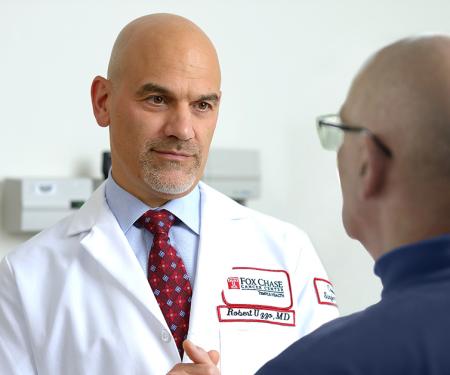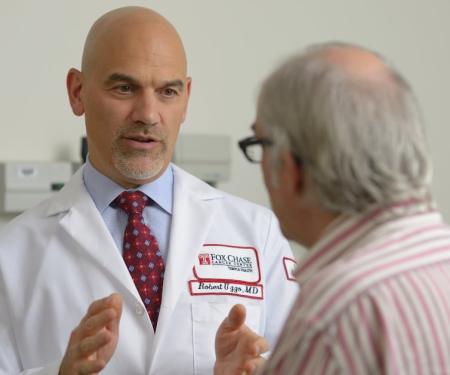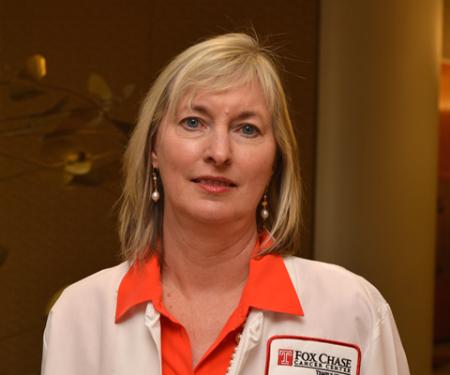Related Articles
00 / 00

Accurate diagnosis is crucial to developing the best plan for treating your type and stage of kidney cancer. Doctors can identify and diagnose kidney cancer tumors using imaging tests and, if warranted, biopsies (the examination of tissue samples). They also use imaging studies to determine if the tumor is localized to the kidney, or if it has spread to other parts of the body (metastasized).
Noncancerous masses, which represent 15–20 percent of kidney tumors, are often indistinguishable from kidney cancer on medical imaging. Our Fox Chase kidney cancer team, however, has performed cutting-edge research to develop tools that separate high-risk cancers from tumors that do not pose an immediate risk to patients.
If kidney cancer is suspected, diagnostic tests may include:
Fox Chase pathologists who specialize in reviewing kidney tissue can diagnose the type and stage of kidney cancer with such tests to determine if it has spread (invasive kidney cancer).
It usually takes at least a few days to receive a test report, although the time varies for each patient. Your physician will provide your test results as soon as possible, provide a thorough explanation, and answer any questions you have. At that time, your physician will recommend potential procedures and treatment options that are right for your diagnosis.
If you’ve been diagnosed with kidney cancer, it may feel urgent to get into care immediately. However, unless your kidney cancer is very aggressive or advanced, we encourage patients to take a little time to step back and gather as much information as possible to make the best choices for them. At Fox Chase, we routinely offer second opinions, which could help identify new treatment options that might be more effective for your condition. In fact, it’s common to seek a second opinion in a cancer diagnosis; some insurance companies even require it.
Coming to Fox Chase also means you’ll likely have greater access to clinical trials that might be appropriate for your condition. Fox Chase has been designated as a Comprehensive Cancer Center by the National Cancer Institute (NCI), meaning it is part of a network of research centers where hundreds of clinical trials are going on every day.
If you decide to seek a second opinion at Fox Chase, bring your medical records, imaging results and pathology report, or have your physician forward them to us. (Your pathology report is the medical report that gives a diagnosis based on tests run on tissue samples from the cancer site.) Our nurse navigators can help you manage this. Our specialists will review your pathology report, imaging and medical history thoroughly as they develop their diagnosis and recommend a treatment plan.
When you come for your appointment, it may be helpful to bring a family member or friend who can help you understand and remember the information you receive.
When kidney masses are diagnosed as cancer, the stage of the disease will help determine your appropriate treatment plan. Kidney cancer is categorized by the American Joint Committee on Cancer (AJCC) into four stages of development, each indicating tumor size and how far the disease has spread. Kidney cancer staging is complex and generally defined as follows, according to the National Comprehensive Cancer Network (NCCN) Guidelines for Patients: Kidney Cancer, 2020:
To design an individualized care and treatment plan for each patient, our multidisciplinary kidney cancer team draws on the diverse experience of physicians in surgical oncology, radiation oncology and medical oncology, as well as other clinical staff. We work together to diagnose your cancer and help you make informed decisions about treatment.
Many patients who have been advised elsewhere that their kidneys must be removed have found alternative treatment options at Fox Chase that frequently allow preservation of their kidney and don’t always require surgery. Each member of our kidney cancer program is focused on delivering excellent treatment and helping you retain function.
“At Fox Chase, we work as part of a large multidisciplinary team of surgeons, medical oncologists, radiation oncologists, pathologists and radiologists; this is of great benefit to the patient. A true multidisciplinary approach works here because we are all very close colleagues who respect each other and are committed to an individualized approach to each patient. We are in communication on a daily basis, and we all work on clinical trials together. As a team, we’re committed to advancing the standard of care rather than continuing the status quo. That allows us to bring the latest advances to the patient.” – Daniel Geynisman, MD, medical oncologist and kidney cancer specialist




